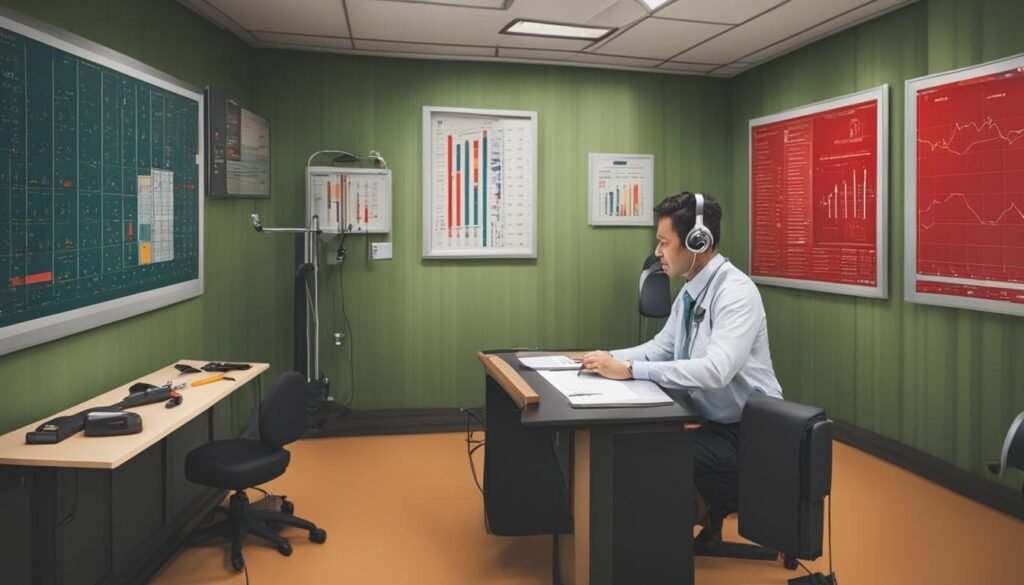Understanding How to Tell if You Need Hearing Aids is vital as we navigate the challenges of hearing loss that often accompanies aging. In the United States, millions face hearing impairments, but recognizing the need for hearing aids can be a turning point in reclaiming quality of life. This guide delves into the critical signs indicating the necessity for hearing assistance. It begins with subtle clues like focusing intently on faces during conversations to compensate for hearing deficits. Other significant indicators include difficulties hearing higher-pitched voices of women and children, frequently asking people to repeat themselves, and struggling in noisy environments.

Hearing loss is more than just a physical condition; it profoundly impacts social interactions and emotional health. It can lead to avoidance of social gatherings, increased stress and anxiety in communication situations, and feelings of frustration or embarrassment due to misunderstandings.
Various factors contribute to hearing loss, such as genetics, noise exposure, natural aging, and certain medical conditions. These can lead to different types of hearing impairment, like sensorineural (SNHL) or conductive hearing loss, each demanding unique management strategies.
Promptly addressing hearing loss is crucial. Neglecting it can adversely affect many life aspects, including mental health, learning capabilities, job performance, and overall well-being. Recognizing when to seek help is the first step towards improving your auditory health and maintaining an engaged, fulfilling life.
Key Takeaways:
- Signs that you may need hearing aids include watching people’s faces more intently, difficulty hearing women and children, constantly needing people to repeat themselves, and struggling to hear in noisy environments.
- Hearing loss can have social and emotional implications, leading to withdrawal from social situations and feelings of stress or frustration.
- Multiple factors, such as genetics, exposure to loud noise, aging, and certain diseases, can contribute to hearing loss.
- Untreated hearing loss can negatively affect mental health, learning abilities, job performance, and overall well-being.
- It is essential to seek professional help if you suspect you may need hearing aids to improve your quality of life.
Common Signs of Hearing Loss
Hearing loss can manifest in various ways, and recognizing the signs is crucial for seeking appropriate treatment. The symptoms of hearing loss can be both social and emotional. One social character is watching people’s faces more intently or reading their lips to understand conversations better. Individuals with hearing loss may also respond inappropriately during conversations, as they may misinterpret what was said. Difficulty hearing women and children is another common sign, as their higher-pitched voices can be more challenging to discern for those experiencing hearing loss. Additionally, struggling to hear in noisy places or environments is a prevalent sign of hearing loss.
Emotionally, hearing loss can significantly impact an individual’s well-being. Some emotional signs include withdrawing from social situations to avoid the frustration of being unable to participate in conversations fully. Feeling stressed or anxious about trying to understand and hear and becoming annoyed with others due to the inability to comprehend them are also indicators of hearing loss. Furthermore, individuals with hearing loss may feel embarrassed or hesitant to meet new people, fearing potential misunderstandings or miscommunication.
Recognizing these signs of hearing loss is the first step toward seeking appropriate support and treatment. Suppose you or a loved one is experiencing any of these signs. In that case, it is recommended that you consult with a professional audiologist for a thorough evaluation and guidance on the next steps.
Reasons for Hearing Loss
Hearing loss can occur due to various factors affecting the ear’s parts. Understanding the reasons for hearing loss can provide insight into this condition’s different types and causes.
One common type of hearing loss is sensorineural hearing loss (SNHL), which occurs due to problems with the inner ear. SNHL can be caused by a range of factors, including diseases like Meniere’s disease or otosclerosis, exposure to loud noise over time, the natural aging process, and genetic predisposition.
How to use goldenseal powder for tinnitus? Our exclusive feature on ‘how to use goldenseal powder for tinnitus’ offers a deep dive into this herbal remedy and its potential benefits for those suffering from tinnitus.
Another type of hearing loss is conductive hearing loss, caused by middle or outer ear issues. Common causes of conductive hearing loss include poor Eustachian tube function, fluid accumulation in the middle ear, and ear infections. It’s important to note that hearing loss can also be a combination of sensorineural and conductive factors, known as mixed hearing loss.
Understanding the reasons for hearing loss is crucial in determining the most appropriate treatment and management options for individuals experiencing this condition. By identifying the underlying causes, healthcare professionals can develop personalized plans to address each patient’s needs.
Indications for a Hearing Aid
Recognizing the signs of hearing loss is crucial in determining whether you need a hearing aid. Some common indications include:
- Experiencing communication problems: Difficulty understanding conversations, especially in noisy environments, can indicate hearing loss.
- Being exposed to loud noises: Prolonged exposure to loud noises, such as working in a noisy environment or attending loud concerts, can contribute to hearing loss over time.
- Having a family history of hearing loss: A genetic predisposition may increase your risk if hearing loss runs in your family.
- Taking medications that can harm your hearing: Certain drugs, such as antibiotics or chemotherapy, can negatively affect your hearing.
It’s important to address hearing loss promptly, as untreated hearing loss can negatively affect various aspects of your life. Some of the potential consequences of untreated hearing loss include:
- Impact on mental health: Hearing loss can contribute to feelings of isolation, depression, and anxiety.
- Reduced learning abilities: Hearing loss can make understanding and processing information challenging, affecting your ability to learn and retain new knowledge.
- Decreased job performance: Communication plays a vital role in the workplace, and untreated hearing loss can hinder your ability to interact with colleagues and perform your duties effectively.
- Overall well-being: Hearing loss can negatively impact your overall quality of life, affecting your relationships, social interactions, and happiness.
If you suspect you may need a hearing aid, it is recommended that you consult with a healthcare professional or audiologist. They can evaluate your hearing and guide you to suitable hearing aid options to address your needs. I Hear People Talking But Can’t Understand Them?
A common type of hearing loss is difficulty understanding speech, especially higher-pitched sounds. This can make conversations more challenging, particularly in noisy environments. When you have trouble understanding speech, you often have difficulty hearing high-frequency sounds essential for clear speech comprehension.
Hearing loss in high frequencies, known as high-frequency hearing loss, can occur due to various factors such as aging, exposure to loud noise, or certain medical conditions. High-frequency sounds carry necessary consonant sounds like “s,” “f,” and “th,” which are crucial for understanding speech. When these sounds are muffled or distorted, it becomes harder to decipher the meaning of words and conversations.
High-frequency hearing loss can significantly impact your daily life and communication. You may frequently ask people to repeat themselves or need clarification on what others are saying, especially in situations with background noise. This can lead to frustration, social isolation, and reduced quality of life.
Common signs of difficulty understanding speech due to high-frequency hearing loss include:
- They struggled to hear and understand women and children, as their voices were often higher-pitched.
- Need help following conversations in noisy environments, such as restaurants or crowded gatherings.
- Misinterpreting words or mishearing them leads to misunderstandings.
- I feel exhausted or mentally drained after attempting to understand speech for extended periods.
If you experience any of these symptoms, seeking professional help from an audiologist is essential to have your hearing evaluated. An audiologist can conduct a comprehensive hearing test to determine the extent of your hearing loss and recommend appropriate solutions, such as hearing aids or assistive listening devices, to improve your speech understanding and overall communication abilities.
Explore the latest insights on whether can migraines cause hearing loss.
Getting Your Hearing Tested and Fitted for a Hearing Aid
If you suspect a hearing issue, getting your hearing tested by a professional audiologist is crucial. An audiology test is a comprehensive examination that evaluates your hearing abilities and identifies any potential hearing loss. During the trial, you will be presented with different tones at varying volumes to assess your hearing threshold. To understand your hearing health, the audiologist will also comprehensively evaluate your middle ear function and word recognition abilities.
After the test, the audiologist will provide immediate feedback and advice on hearing conservation. If the results indicate that you could benefit from a hearing aid, you will have a consultation with the audiologist to discuss suitable options. It is essential to thoroughly examine the best hearing aid for your needs, considering your lifestyle, budget, and personal preferences.

The fitting process involves customizing the hearing aid to your individual needs. The audiologist will select the appropriate settings and programming to optimize your hearing experience. They will ensure that the hearing aid is comfortable and fits securely. Additionally, they will provide detailed instructions on how to use and maintain the device properly.
You can proactively address your hearing loss by seeking professional help and undergoing audiology tests. The guidance of an audiologist will ensure that you receive the most accurate diagnosis and appropriate treatment. A hearing aid, if recommended, can significantly improve your quality of life, allowing you to reconnect with the world of sounds and enhance your communication abilities.
Advancements in Hearing Aid Technology and Over-the-Counter Options
Hearing aid technology has made significant advancements in recent years, providing individuals with hearing loss improved options for better hearing. Today, most hearing aids are digital and offer sophisticated features to enhance sound quality and improve the listening experience. These technological advancements have transformed the way we perceive and address hearing loss.
One notable advancement in hearing aid technology is the integration of Bluetooth capabilities. Many modern hearing aids can connect wirelessly to devices like smartphones, computers, and televisions, allowing for seamless audio streaming directly to the hearing aids. This technology enables individuals to enjoy clear and amplified sound without additional accessories or devices.
Read Also: How to Say Hearing Aid in Spanish
Additionally, there has been a rise in over-the-counter (OTC) hearing aid options. These hearing aids can be purchased without a prescription or fitting from a healthcare professional. While OTC hearing aids can be a convenient and affordable option for some individuals with mild to moderate hearing loss, it’s essential to consult an audiologist to ensure that the chosen hearing aid meets your needs. They can guide you in selecting the correct type of OTC hearing aid and provide personalized recommendations based on your hearing profile.

With the advancements in hearing aid technology, individuals with hearing loss now have various options to improve their auditory experience. Whether it’s the integration of Bluetooth connectivity or the availability of OTC hearing aids, the goal is to provide individuals with the best possible hearing solution that suits their unique needs.
Conclusion
In conclusion, recognizing the signs of hearing loss and taking proactive steps to address it can significantly improve your quality of life. If you suspect a hearing issue, getting your hearing tested by a professional audiologist is essential. Through a comprehensive audiology test, you can determine the extent of your hearing loss and receive personalized advice on hearing conservation.
Hearing aids enhance communication, reduce frustration, and improve overall well-being. They are designed to amplify sound and help individuals with hearing loss regain their ability to hear and understand speech. With technological advancements, hearing aids now offer Bluetooth connectivity, making connecting with smartphones and computers easier.
Don’t hesitate to seek professional help if you need hearing aids. By addressing your hearing loss with the appropriate treatment, you can experience the numerous benefits of improved hearing, ensuring a better quality of life for yourself and your loved ones.
Frequently Asked Questions
What are the signs that you may need a hearing aid?
Some signs that you may need a hearing aid include watching people’s faces more intently, having trouble hearing women and children, constantly needing people to repeat themselves, and having difficulty hearing in noisy places or situations.
What are the social signs of hearing loss?
Social signs of hearing loss include watching people’s faces more intently or reading their lips, responding inappropriately during conversations, having trouble hearing women and children, and having difficulty hearing in noisy places.
What are the emotional signs of hearing loss?
Emotional signs of hearing loss include:
- Withdrawing from social situations.
- Feeling stressed or anxious about trying to understand and hear.
- Feeling annoyed with people because you can’t understand them.
- Feeling embarrassed or reticent about meeting new people.
What are the common causes of hearing loss?
A variety of factors can cause hearing loss. Inner ear problems cause sensorineural hearing loss (SNHL) due to disease, exposure to loud noise, aging, and genetics. Conductive hearing loss is caused by issues within the middle and outer ear and can be due to poor Eustachian tube function, fluid in the middle ear, and ear infections. Mixed hearing loss is a combination of sensorineural and conductive hearing loss.
What are the indications for a hearing aid?
Indications for a hearing aid include experiencing communication problems, being exposed to loud noises over a long period, having a family history of hearing loss, and taking medications that can harm your hearing. Untreated hearing loss can negatively affect your life, including mental health, learning abilities, job performance, and overall well-being.
Why can I hear people talking but can’t understand them?
A common type of hearing loss is difficulty understanding speech, especially higher-pitched sounds. This can result in hearing speech needing to understand the meaning, particularly with high-pitched consonants fully. This hearing loss can make conversations more challenging, especially in noisy environments.
How do I get my hearing tested and fitted for a hearing aid?
If you suspect a hearing issue, getting your hearing tested by a professional audiologist is essential. The test involves being presented with different tones at varying volumes and responding to them. The audiologist will also assess your middle ear function and word recognition abilities. After the test, you will receive immediate feedback and advice on hearing conservation. If you are a candidate for hearing amplification, you will have a consultation with an audiologist to discuss hearing aid options.
What advancements have been made in hearing aid technology?
Hearing aid technology has advanced significantly, with improvements in both hardware and software. Most hearing aids are now digital and have Bluetooth capabilities for connectivity to devices like smartphones and computers. There are also over-the-counter hearing aid options, though it is recommended to consult with an audiologist to ensure that you choose the right type of hearing aid for your specific needs.
How can hearing aids improve my quality of life?
Recognizing the signs of hearing loss and taking proactive steps to address it by getting a hearing test and considering hearing aids can significantly improve your quality of life. Hearing aids can enhance communication, reduce frustration, and improve overall well-being for individuals with hearing loss and their loved ones. Don’t hesitate to seek professional help if you need hearing aids.



